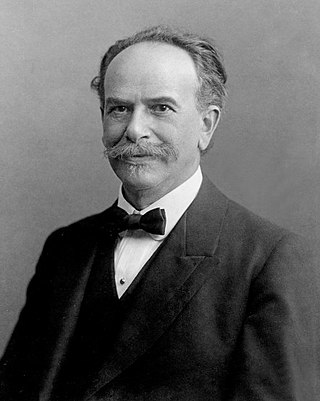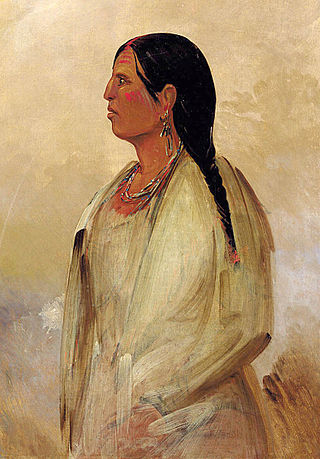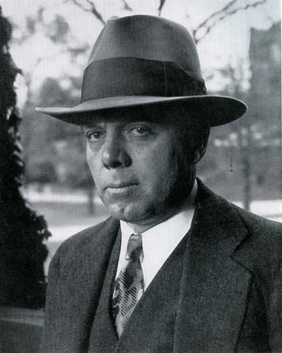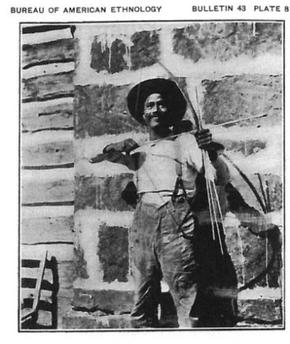
Franz Uri Boas was a German-American anthropologist and ethnomusicologist. He was a pioneer of modern anthropology who has been called the "Father of American Anthropology". His work is associated with the movements known as historical particularism and cultural relativism.

The Yuchi people are a Native American tribe based in Oklahoma, though their original homeland was in the southeastern United States.

Charles Marius Barbeau,, also known as C. Marius Barbeau, or more commonly simply Marius Barbeau, was a Canadian ethnographer and folklorist who is today considered a founder of Canadian anthropology. A Rhodes Scholar, he is best known for an early championing of Québecois folk culture, and for his exhaustive cataloguing of the social organization, narrative and musical traditions, and plastic arts of the Tsimshianic-speaking peoples in British Columbia, and other Northwest Coast peoples. He developed unconventional theories about the peopling of the Americas.
Alfred Irving "Pete" Hallowell was an American anthropologist, archaeologist and businessman.

Indigenous peoples of the Southeastern Woodlands, Southeastern cultures, or Southeast Indians are an ethnographic classification for Native Americans who have traditionally inhabited the area now part of the Southeastern United States and the northeastern border of Mexico, that share common cultural traits. This classification is a part of the Eastern Woodlands. The concept of a southeastern cultural region was developed by anthropologists, beginning with Otis Mason and Franz Boas in 1887. The boundaries of the region are defined more by shared cultural traits than by geographic distinctions. Because the cultures gradually instead of abruptly shift into Plains, Prairie, or Northeastern Woodlands cultures, scholars do not always agree on the exact limits of the Southeastern Woodland culture region. Shawnee, Powhatan, Waco, Tawakoni, Tonkawa, Karankawa, Quapaw, and Mosopelea are usually seen as marginally southeastern and their traditional lands represent the borders of the cultural region.

The stomp dance is performed by various Eastern Woodland tribes and Native American communities in the United States, including the Muscogee, Yuchi, Cherokee, Chickasaw, Choctaw, Delaware, Miami, Caddo, Tuscarora, Ottawa, Quapaw, Peoria, Shawnee, Seminole, Natchez, and Seneca-Cayuga tribes. Stomp dance communities are active in Georgia, North Carolina, Oklahoma, Alabama, Mississippi, and Florida.
Sergei A. Kan is an American anthropologist known for his research with and writings on the Tlingit people of southeast Alaska, focusing on the potlatch and on the role of the Russian Orthodox Church in Tlingit communities.
Raymond David Fogelson was an American anthropologist known for his research on American Indians of the southeastern United States, especially the Cherokee. He is considered a founder of the subdiscipline of ethnohistory.
Thomas Crowell-Taylor "Tim" Buckley was an American anthropologist and Buddhist monastic best known for his long-term ethnographic research with the Yurok Indians of northern California, his early work in the anthropology of reproduction, including menstruation and culture and for his major reevaluation of the work of Alfred L. Kroeber.

Frank Gouldsmith Speck was an American anthropologist and professor at the University of Pennsylvania, specializing in the Algonquian and Iroquoian peoples among the Eastern Woodland Native Americans of the United States and First Nations peoples of eastern boreal Canada.
Raymond J. DeMallie was an American anthropologist whose work focuses on the cultural history of the peoples of the Northern Plains, particularly the Lakota. His work is informed by interrelated archival, museum-based, and ethnographic research in a manner characteristic of the ethnohistorical method. In 1985 he founded and became the director of the American Indian Studies Research Institute at Indiana University Bloomington, alongside Douglas Parks, whom he worked collaboratively throughout majority of his career to preserve and translate various Indigenous languages, after having first met in 1980. Shortly after Parks started to work with DeMallie at Indiana University Bloomington. They got married in 2016.
Michael Eugene Harkin is one of the leading anthropologists in the United States specializing in the ethnohistory of indigenous people of the western U.S. and Canada. He is currently professor and former chair of anthropology at the University of Wyoming, having previously taught at Emory University and Montana State University. In 2011 he was Fulbright Distinguished Chair in Cultural Studies at the Karl-Franzens University in Graz, Austria, and in 2007 he was a visiting professor at Shanghai University.
Ira Stuart Jacknis was an American anthropologist who studied Native American art of the Northwest Coast. Jacknis had studied anthropology and art history as an undergraduate, deepening his interests in the history of anthropology while working as an intern at the Smithsonian Institution under curator William C. Sturtevant. He then continued his studies in history and anthropology under the tutelage Nancy Munn, Raymond Fogelson, and George W. Stocking at the University of Chicago. Much of Jacknis' work connected to ethnography, art history, and the history of anthropology.
William Curtis Sturtevant was an anthropologist and ethnologist. He is best known as the general editor of the 20-volume Handbook of North American Indians. Renowned anthropologist Claude Lévi-Strauss described the work as "an absolutely indispensable tool that should be found on the shelves of all libraries, public and private alike."
Daniel C. Swan is an American cultural anthropologist and museum curator whose work has focused on documenting and interpreting the cultural history of the Americas. He has specialized particularly on the histories, social organizations, and cultures of Native North American peoples in Oklahoma, USA. His research on the history, significance, and artistic forms of the Native American Church has led to research and exhibition collaborations with artists and elders in a diversity of American Indian communities, both in Oklahoma and elsewhere in the Western United States. In addition to his work on American Indian topics, he has organized exhibitions and museum catalogs about cultural diversity in the American West and in the Western Hemisphere more broadly.

Museum anthropology is a domain of scholarship and professional practice in the discipline of anthropology.

Watt Sam was a Natchez storyteller and cultural historian of Braggs, Oklahoma and one of the two last native speakers of the Natchez language.
Nancy Raven, also known as Nancy Taylor, was a Natchez storyteller from Braggs, Oklahoma and one of the last two fluent speakers of the Natchez language.
James Rolfe Murie was an American farmer and ethnographer conducting research among the Pawnee Tribe in Nebraska, of which he was also a member. Murie wrote the Ceremonies of Pawnee, which included accounts of songs utilized in three South Band ceremonies, constituting one of the most extensive song collections for any Native American tribe ever described. Murie also collaborated with anthropologists Alice Fletcher, George Dorsey, and Clark Wissler.







